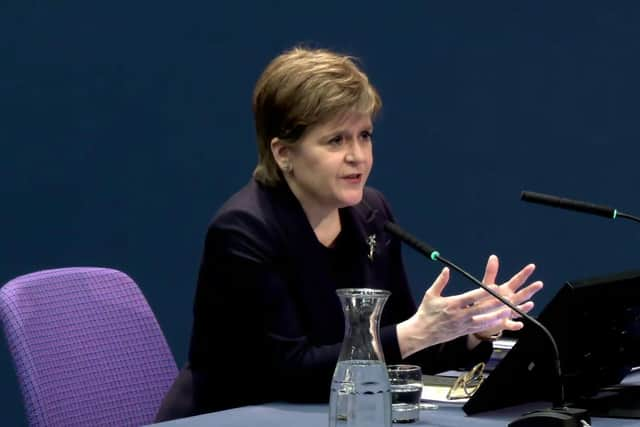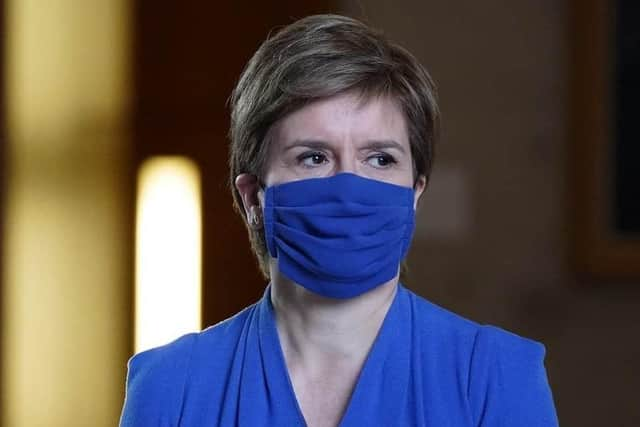UK Covid Inquiry: Nicola Sturgeon says she ‘rarely’ used WhatsApp as she confirms messages deleted
Nicola Sturgeon has told the UK Covid Inquiry she “very rarely” used WhatsApp and other informal messaging services, as she confirmed she deleted her messages.
The former first minister said she only exchanged WhatsApps with “a handful of people”, including Liz Lloyd, her former chief of staff, and Humza Yousaf.
Advertisement
Hide AdAdvertisement
Hide AdBoth Ms Lloyd and Mr Yousaf, who is now the First Minister, have handed over messages to the inquiry.


Ms Sturgeon did not retain any WhatsApps or texts on her own device.
Giving evidence on Wednesday, Ms Sturgeon said: "I did not do government business through informal messaging, in relation to Covid or any other matter.”
She said it was not her practice to have “substantial or lengthy or detailed discussions about government decisions through these means”, adding: “It’s not my style, its not my practice, it’s never been my practice, not least because I don’t think it’s a good or effective or helpful way of reaching decisions.”
In August 2021, Ms Sturgeon was asked by a journalist if she would disclose all her personal emails and WhatsApps, and she said she would.


The former first minister apologised to the inquiry if this answer was not clear. She said her position was that any substantive points or decisions would have been formally recorded in the system.
Jamie Dawson KC, senior counsel to the inquiry, put it to Ms Sturgeon that she “at least rarely used” informal messaging.
She said: “I have not said and I’m not saying today that I never used informal means of communication. What I am saying is that I did so very rarely and not to discuss issues of substance or anything that could be described as decision making.
Advertisement
Hide AdAdvertisement
Hide Ad“There was a high degree of formality around the decision making of the Scottish Government.”
The inquiry saw an exchange between Ms Sturgeon and Ms Lloyd in October 2020 in which the former said she was having “a bit of a crisis of decision-making” in relation to hospitality restrictions. The pair discussed the rules in place at the time, and Ms Sturgeon worried the industry would “go mad” at the restrictions, which were “all so random”.
Mr Dawson suggested this was an example of a messaging exchange that potentially shed light on how decisions were made.
Ms Sturgeon said she was simply talking about things that would later be raised at a cabinet meeting. She said she did not think there was anything in the exchange that would not be reflected elsewhere.
Earlier, she said WhatsApp had become “too common” a means of communication within the Scottish Government.
She said: “When people are sending messages on WhatsApp, they don’t think, including me and therefore messages, when they are looked back at later on, can be open to different interpretations because people haven’t really thought about the words they’re using. And I think that certainly would be true of some of the exchanges that the inquiry has been looking at.”
She said she operated on the basis that messages relating to government business should not be kept on a phone that could be lost or stolen.
Ms Sturgeon said she was “certain” the inquiry has access to everything “germane” to Scottish Government decision-making.
Advertisement
Hide AdAdvertisement
Hide AdElsewhere, Ms Sturgeon told the inquiry: “Openness and transparency with the Scottish public was very important to me from the outset of the pandemic. I communicated to the public on a daily basis for a lengthy period of time.
“We will not have got every decision right, and we will have made misjudgments and there will be undoubtedly instances put to me today where on reflection I will think that we could have been more transparent than we were, but given the nature of the emergency that we were confronted with, building a relationship of trust with the public was important, and in my view then and in my view now that had to be built on a spirit of openness.”
She said she will carry the impact of decisions she made throughout the pandemic forever.
She said: “These decisions were of a magnitude beyond what I had ever experienced, and that is true of decision makers everywhere and the impact of them I think about literally every day. I want this inquiry and the Scottish inquiry to scrutinise those decisions so that we can learn and future governments can learn lessons from them.”
Comments
Want to join the conversation? Please or to comment on this article.
